

Killer bacteria could wipe out Christmas Island's blue-tailed skink, Lister's gecko unless cure found. New research shows Christmas Island reptiles are facing extinction from a deadly microscopic killer.
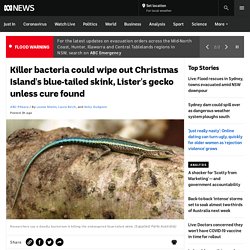
Key points: New research shows a deadly bacteria is killing the Lister's gecko and blue-tailed skink, both native to Christmas IslandTwo other Christmas Island species have been declared extinct this monthExperts say Christmas Island species are particularly vulnerable to extinction According to a study by the University of Sydney, a bacterium is threatening captive populations of the Lister's gecko and the blue-tailed skink, which have already died out in the wild. Scientists described Enterococcus lacertideformus as a "silent killer" with no cure. Co-lead researcher Jessica Agius said the microorganism grew inside animals' heads before spreading to their internal organs, where it killed them. Ms Agius said the disease was discovered in 2014, but the recent study in reptile populations helped scientists gain a better understanding of it so they could find an antibiotic cure.
A sobering trend. Escargot in cargo: Invasive giant African snails detected more than 28 times at borders. Australian biosecurity officers are alarmed by an increase in invasive 20-centimetre-long snails intercepted at the border checkpoints.
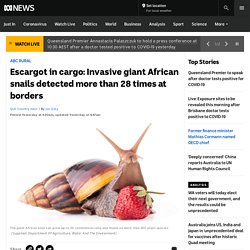
Key points: Giant African snails have been found at checkpoints 28 times last year and three times in the past monthThe species is considered one of the world's most invasive pestsGiant snails eat 500 plant species and are a serious threat to Australian farms and ecosystems. Cloud forest thrives on World Heritage-listed Lord Howe Island after pest eradication. Ecologist Ian Hutton has lived on World Heritage-listed Lord Howe Island for 40 years and says it's a thrilling life, surrounded by pristine waters and subtropical forests.
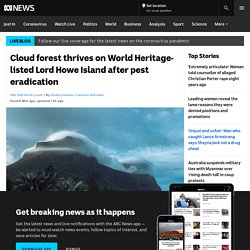
Key points: A rare island cloud forest exists at the top of Lord Howe Island, which is home to a large number of endemic species There is evidence the cloud forest is flourishing after a pest eradication program in 2019Over time, the appearance of the island's mountains is expected to change as the forest thrives Dr Hutton said there were still new things discoveries to be made on the island, which lies about 600 kilometres east of mainland Port Macquarie. "Running around outside the door is one of the world's rarest birds, the woodhen, seabirds are flying overhead, and after a five-minute walk from the house I can go down and have a swim in the world's most southerly coral reef in our lagoon," Dr Hutton said.
Farmers say fall armyworm, the 'coronavirus of agriculture', could force up food prices. There are fears food prices could rise as a pest caterpillar described as the "coronavirus of agriculture" continues its relentless march across the country.
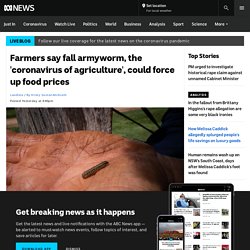
It has been a year since fall armyworm — not the species that eats lawns — was first detected at Bamaga at the tip of Far North Queensland. The hungry caterpillar, native to the Americas, is now devouring crops throughout Queensland and has invaded farms and plantations in the Northern Territory, Western Australia, New South Wales and Victoria. Ray Graham, who owns Queensland's largest dairy farm, says the pest is the biggest threat to the agriculture industry Australia has ever seen. Tropical soda apple, described as the 'weed from hell', has sprouted following Black Summer. Farmers along the north coast of New South Wales are at war with a noxious weed that has sprung out of the ground following the 2019 bushfires.
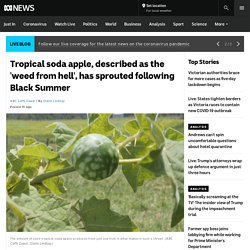
Key points: Tropical soda apple is one of only two weeds in NSW with a biosecurity control orderNative to South America, tropical soda apple is a species that prefers wet environmentsIncreased rain during the current La Niña brings with it increased risk of spread Tropical soda apple (Solanum viarum) was first identified in Australia in 2010 by beef cattle enterprise owners Caroline and David Duff near Armidale. "This thing is more aggressive than anything I've ever witnessed," Mr Duff said. "It grows all year round, so it's not like those annual weeds. " With seeds germinating in six to 12 weeks and each fruit containing up to 400 seeds, Mr Duff said controlling this "weed from hell" was a daily battle. Kempsey Shire Council weeds officer Greg Egan said the amount of seed tropical soda apple produced from just one fruit was what made it such a threat. Salmon giant Huon objects to Petuna Storm Bay farm licence on biosecurity grounds, documents show.
Tasmania's second-largest salmon company has voiced strong opposition to a competitor's expansion into Storm Bay over biosecurity concerns, warning approval would threaten the sustainability of all three salmon producers, documents obtained by the ABC reveal.
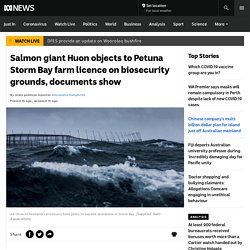
Huon Aquaculture warned approval of Petuna's Storm Bay expansion would pose an unacceptable risk and threaten the sustainability of all three companiesAdvice from the Government's Chief Veterinary Officer warned it would be impossible to separate companies enough to prevent the spread of major diseasesPetuna said it would ensure biosecurity management controls were met once the farm was operational Tasmanian salmon companies Tassal, Huon Aquaculture and Petuna are expanding operations into Storm Bay, south of Hobart, initially to farm a combined total of 30,000 tonnes of salmon — but with the potential to ramp up to 80,000 tonnes. The company did not comment on whether it was considering its legal options in relation to Storm Bay. Bell miners farming sap-loving insects for food, with disastrous consequences for eucalypt forests.
A native bird with a taste for the sugary sap on the back of insects — and a particular talent in "farming" them — could be indirectly causing the destruction of millions of hectares of forest.
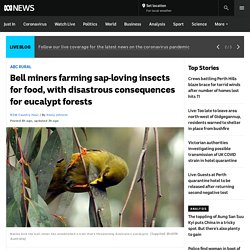
Key points: Bell miners are contributing to eucalypt forest dieback across the east coastThe ingenious bird cultivates colonies of insects for foodThe insects then feed on eucalypts, killing them and causing havoc for biodiversity In ensuring a steady supply of food, the bell miner (Manorina melanophrys) is causing the spread of the deadly tree disease dieback. How it spreads dieback has been found to be a complex relationship that could be likened to milking a cow or shearing a sheep. The bird's favourite food is the sugary sap, or lerp, growing on the back of an insect known as a psyllid.
"But they don't often kill the actual psyllid," biodiversity expert Jim Morrison said. The bird protects its food supply by fighting off anything that would harm its little food incubators. Questions over approval of Storm Bay salmon farming. There are questions about the validity of the decision to green-light one of the most significant aquaculture expansions in Tasmania's history, with documents obtained by the ABC revealing it was made by just three sitting members of the nine-member assessment panel.
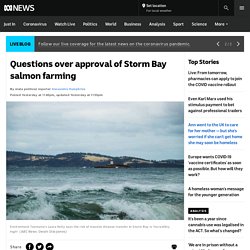
Key points: Documents reveal the recommendation to approve Storm Bay's aquaculture expansion was made by just three sitting members of the nine-member review panelEnvironment Tasmania is seeking legal advice on the validity of the decisionThe review panel was warned it would not be possible to separate aquaculture companies enough to prevent the spread of major diseases The documents also revealed the Marine Farming Planning Review Panel agreed to allow the development in Storm Bay, despite expert advice it would be impossible to separate Tasmania's three largest salmon farming companies enough to prevent the spread of major diseases.
Mouse plague wreaks havoc across two states, destroying crops in Qld, blanketing parts of NSW. A mouse plague is wreaking havoc across multiple Australian states, as people in the town and country pull out all stops to try to control the outbreak.
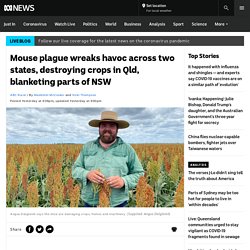
Key points: Mice are causing tens of thousands of dollars worth of damage to crops and property in southern QueenslandLarge numbers of rodents have also been recorded in parts of Central QueenslandParts of NSW are also under siege by mice A "carpet" of mice has blanketed parts of New South Wales, from Merriwa in the Upper Hunter region to Tamworth and Moree in New England. WARNING: Some people may find images in this article distressing.
In Queensland, a plague that began seven months ago is leaving a trail of destruction that has cost tens of thousands of dollars in lost crops and property damage. White spot virus killing wild Australian prawns and crabs, with some experts saying 'it is here to stay' The exotic white spot virus that devastated South-East Queensland prawn farms is now killing wild prawns and small crabs in the Logan river and has become widespread in Moreton Bay.
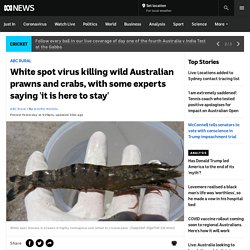
Key points: Surveys confirm white spot virus is killing wild prawns and small crabsWhite spot disease does not harm humansThe disease has spread since an initial outbreak on Logan prawn farms in 2016 The Federal Government is reviewing its import requirements for prawns, and a leading aquatic disease expert warns that a dangerous double standard favouring importers over Australian fishers and aquaculture farmers is leaving the country wide open to the introduction of more dangerous viruses. In a survey finalised for the Fisheries Research and Development Corporation late last year, Dr Ben Diggles discovered dead banana prawns and small crabs in waterways surrounding the Logan river — and live virus in small crustacean species in the marine food chain in Deception Bay, well away from the original incursion.
Tasmanian researcher tracking feral cats in bid to help native wildlife. Australia's wildlife is up to 200 times more likely to come across a deadly feral cat than an equivalent native predator, according to new research from the University of Tasmania. Key points: University of Tasmania researchers looked at the impact of the feral cat compared to the native spotted quoll Researchers used GPS collars to record an animal's location every five minutes for a monthRowena Hamer said while it would be "ideal" to remove all feral cats, to do so would be "pretty tricky" The study also found feral cats hunt in greater numbers with more intensity, and in a broader range of habitats than its equivalent native marsupial predator, the spotted-tailed quoll. Feral buffalo numbers nearing 200,000 head, NT wildlife experts say more culling needed.
Wildlife management experts say feral buffalo numbers are "out of control" as more landowners in the Top End choose to muster buffalo for commercial gain, rather than reducing the population via aerial culling programs. Key points: The Top End is home to at least 187,000 feral buffalo, which is 26,000 more than last yearMore landowners are giving access to mustering contractors instead of doing large aerial culling programsBoth wildlife management experts and the buffalo industry are calling for a new and integrated approach According to research from Territory Natural Resource Management (TNRM), the consequence of less culling has accelerated the population growth, and there is now an estimated 187,000 feral buffalo roaming the Northern Territory.
Byfield National Park becomes last line of defence against threat to pandanus - ABC News. A Central Queensland national park has become the front line of defence against a pest insect that has destroyed thousands of pandanus trees in the south of the state. Key points: A pandanus dieback specialist is worried an infestation of planthopper is moving northByfield National Park, north of Yeppoon, has the healthiest large population of pandanus along the east coast and is now the front line of defence against the pestThe pandanus planthopper was first found on the Gold Coast 25 years ago Pandanus dieback specialist Joel Fostin has been working with local councils along Queensland's coast to tackle the pandanus planthopper, which has already destroyed 60,000 pandanus trees in just six years.
More mystery seeds turn up uninvited in Australian letterboxes - ABC News. More than 260 unidentified, unsolicited, mystery seed parcels have been found in letterboxes around Australia this year, raising serious concerns about biosecurity breaches. Key points: Fears of biosecurity breaches grow as more than 160 packets of mystery seeds are reported Authorities don't know what the seeds are and won't say where they have come from In 2020, there were 45,000 "risky" seed packets posted from overseas Despite authorities using detector dogs and x-ray machines to intercept 45,000 "risky" seed parcels at mail centres across the country, the mystery seeds were reported to the Department of Agriculture, Water and Environment by concerned community members, prompting fears more seeds could have escaped detection.
Why there's a lot more to love about jacarandas than just their purple flowers - ABC News. Every spring, streets across Australia turn purple with the delicate, falling flowers of jacarandas. This year, they'll likely be flowering over Christmas. The colour of the flowers is often debated — is it indigo, blue or purple? Well, it's all of them and more as the colour ranges from deeper to lighter shades depending on the specimen, soils and season. Jacaranda is so well known to Australians and so well loved, that many of us think of them as a native. Invasive keyhole wasp builds nests in aircraft instruments, may pose 'significant risk' to air safety - ABC News. Sri Lanka digs moat around rubbish tip to keep hungry elephants out - ABC News. Northern Australia's saltwater crocodiles under investigation following dramatic rise in population - ABC News. Controversial Daintree River bridge back on the agenda as Douglas Shire Council surveys community - ABC News.
Massive feral pig population thrives as pest feasts on harvest spoils - ABC News. Portable, inflatable people may be solution to dingoes and livestock co-existing - ABC News. Those wacky, inflatable, arm-flailing tube people may be the solution to keeping dingoes away from farms and livestock. Key points: A new study finds the random movements of an inflatable person can be an effective dingo deterrentResearchers say the strategy may be used by graziers during lambing season to protect vulnerable stock from dingoesThey say farmers will save money by using the inflatable people as a non-lethal control method. Australia claims small world-first victory against fire ants, but not everyone is convinced of the strategy - ABC News. Turtles could solve the Murray-Darling's carp problem, research shows - ABC News. Fears seismic testing undermining southern rock lobster industry's recovery efforts - ABC News. Before myxomatosis decimated feral rabbit populations, it was almost scrapped as a failure - ABC News.
Seismic surveying reduces whiting catch rate by 99.5 per cent, research finds - ABC News. Antarctic biodiversity increasingly under threat as human activity spreads across continent - ABC News. New aerial biocontrol weapon released to help fight notorious tropical Siam weed - ABC News. Booming fly population making life difficult on outback stations - ABC Rural - ABC News. Cattle producers in Central Australia say the fly population there has exploded in the past few months, making working outside almost unbearable.
Key Points flies in the outback Key points: Flies are so bad in Central Australia some cattle producers have bought fly nets for the first time One theory is the decline in dung beetles because of the drought has allowed flies to breedSome pastoralists are hopeful the fly population explosion is a sign of a good season to come Pastoralists are begrudgingly starting to buy fly nets for the first time, a bush fashion faux pas normally associated with overseas tourists visiting the outback. At Aileron Station, about 135 kilometres north of Alice Springs, manager Sarah Cook said the sheer number of flies made it difficult to work outside. "The flies have been horrendous and so thick," she said.
For the first time in her five years at the station the team at Aileron has started to wear fly veils. The flies are thick at Aileron Station. Meet the nocturnal moth stealing nectar from your fruit so it rots while you sleep. Updated about 2 hours agoTue 21 Apr 2020, 3:23am To their puzzlement and dismay, gardeners and growers in Queensland have been waking up to discover their fruit on the ground, ruined. Key points: The nocturnal fruit-piercing moth penetrates ripening fruit, then feasts on the nectar insideGardeners and fruit growers had been puzzled when finding healthy fruit suddenly rotting on the groundThe surge in numbers may be due to heavy rains following prolonged drought conditions The culprit, experts believe, is a nocturnal fruit-piercing moth with a drill-like proboscis that allows it to feast on the nectar-like juice inside the fruit.
White spot disease discovered again in South East Queensland. Posted about 5 hours agoTue 21 Apr 2020, 12:32am Two prawn farms on the Logan River in South East Queensland have returned positive test results for white spot disease more than three years after it was first detected in the area. Farmer trials attracting bugs to protect his vegetable crops rather than relying on pesticides. Pomelos from the Northern Territory overcoming big challenges to get to market - ABC Rural - ABC News. Native frogs are being confused for cane toads in fatal case of mistaken identity. Pasture dieback killing grass 'like glyphosate' sparks emergency research for solution - ABC Rural - ABC News.
Armyworms are on the march in suburbia, devouring lawns in their path. Fall armyworm spreads 1,000 kilometres south from detection point, dashing eradication hopes - ABC Rural - ABC News. Tasmania Parks and Wildlife Service asks track users to think twice before picking up a walking stick. Brumbies in NSW National Parks pose a bigger problem not addressed by feral animal cull. Tropical snake decline linked to deadly frog disease - Science News - ABC News. Fall armyworm found in Torres Strait, prompting biosecurity alert amid fears for Australian crops. Bushfire-hit private conservation land faces feral threat as recovery money hits roadblock.
Thousands of culled camels are rotting in the desert. Is this an answer to the wastage? Unprecedented locust plague in Kenya and Horn of Africa threatening food security. Cockle Creek caretakers volunteer at southernmost point of Australian track system. Fruit fly larvae reach Tasmanian shores on a Queensland mango. Arnhem Land rangers fight against feral pigs spreading deadly fever to Australia.
Eleven years, millions of dollars and no closer to eradicating weed of 'national significance' Native bees die three times faster from honey bee parasite, researchers find. Fox baiting innovation keeps native species, even working dogs, far from the poison targeting pest - ABC Rural - ABC News. Lord Howe currawong is focus of research program assessing the impact of large-scale rodent eradication. Chevron's Gorgon gas plant construction sees 30,000 native animals moved to safety.
Invasive yellow crazy ants found at gateway to Whitsundays and Great Barrier Reef. A 'snotweed' scourge is smothering seagrass — and now oysters are being deployed to fight it - ABC Rural - ABC News. Corella flocks descend on coastal areas as wildlife experts search for answers. Pest or protected game species? Push to rethink shooting rules as farmers battle feral deer. Lionfish are invading Mediterranean waters and Cyprus is trying to eat its way out of the crisis.
Feral and pet cats are hunting and killing billions of animals each year in Australia. Uluru climb closure looms as region nears breaking point with overflow of tourists, 'influx of waste' Rogue Siamese fighting fish breeding by the thousands in Darwin's Adelaide River. Invasive bird species need suitable climates and other aliens to flourish - Science News - ABC News.
Farmers turning their backs on Roundup and searching for alternatives - ABC Rural - ABC News. Lantana removal expert warns spread of the poisonous weed is a 'catastrophe' for Australia - ABC Rural - ABC News. Instagram weddings blamed for popularity of pampas grass, a noxious weed. Cane toad find in Western Australia's south-west likely to be hitchhiker.
Murderous, bullying peacocks top of pecking order in bizarre NT backyard blues. Cape Barren geese poo and chew their way through Phillip Island, cause headaches for farmers - ABC Rural - ABC News. Invasive alien red-eared slider turtle found in Bundaberg backyard. Overgrown kikuyu grass on remote Gabo Island blocks little penguins from their burrows. European wasp warning for WA as record numbers of the aggressive insect discovered.